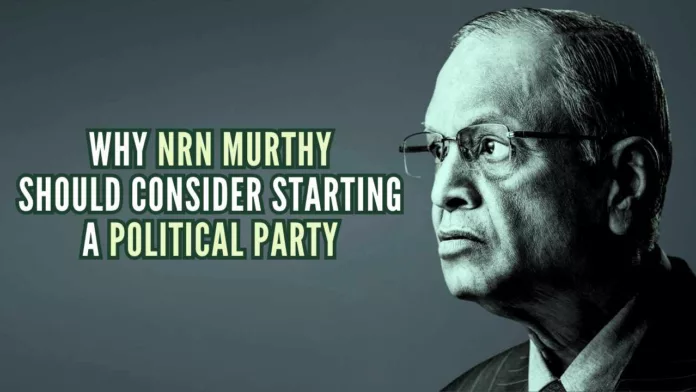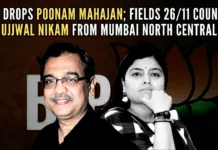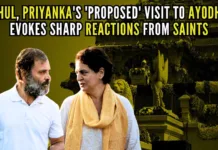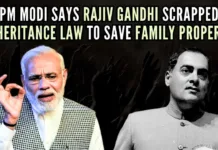
Why a new political party needed, distinct from existing ones
I was thinking aloud, what if N R Narayana Murthy, founder of Infosys, were to launch a political party? This party could prioritize professionals with demonstrated integrity and competence for key roles.
I can hear objections such as, “…but he’s from the upper caste”, “…but he’s super rich”, “…the masses won’t vote for such a party”, etc. Please read this article in full; I’m answering all objections.
Murthy’s global entrepreneurial success and commitment to ethical business practices make him uniquely positioned to contribute significantly to India’s transformation through politics. A very small percentage of his wealth (which he can easily spare) could be allocated to this socio-political venture, a contribution that would align with his commitment to India’s well-being.
The outcomes of the 2014 and 2019 parliamentary elections, the subsequent opinion polls (including the Mood Of The Nation bi-annual Polls), and the recent 5-state elections highlight a growing reluctance among voters to consider Congress as a national alternative; at best, voters prefer it in a few state-level elections.
Despite my personal support for the BJP, I recognize the need for a credible opposition at the national level.
The absence of such an alternative compels a large section of voters opposed to the BJP to reluctantly vote for the Congress or one of the alternative parties or alliances, though these options may not align with their preferences.
Critics argue that a majority of voters (approximately 60%) dislike the BJP, but the ‘first past the post’ system secures the BJP a strong mandate. However, this system has existed for decades without such objections gaining prominence. The framers of our Constitution, headed by the eminent Dr. Ambedkar, considered all the alternatives before deciding on this model.
The anti-BJP lobby also argues that, if the opposition (like the I.N.D.I. Alliance) puts up one common candidate against BJP in each constituency, this alliance would win. If so, such voters could have tactically voted for the opposition party with the best chance to defeat BJP in each constituency, if they had wanted[1]. This has not happened.
The political parties who oppose Modi (other than the Congress) are winning against BJP in state elections anyway. There is very insignificant support for these parties in states outside their base. And Congress wins in states where it is strong, even if infrequently.
All this goes to prove that, for many voters who don’t like the BJP, their dislike for the alternatives is just as strong. So, even in the event of the existence of an alliance like the I.N.D.I.A., there is a high likelihood that voters may vote for the BJP if their preferred party were not in contention in their constituency. I have explained in my article [2], how people decide who to vote for.
In summary, while many voters consider BJP a credible party to vote for, at the Centre, the other voters don’t have an equally credible alternative to vote for. This is not in the interest of Indian politics.
While the BJP leans somewhat right and Congress leans somewhat left, potential I.N.D.I. Alliance partners claim a position between the two. However, the lack of commitment to stated economic ideologies among opposition parties makes ideological coherence within the alliance unlikely to be a hindrance[3].
Some voters are genuinely secular and believe the BJP is not. Some don’t like to vote for Modi for his personality traits. Some want to vote for a party with a better federal outlook than BJP. Some don’t like the Economic, Foreign, and/ or Defence Policy of the BJP.
All such voters are now forced to vote for one of the available options, which is not desirable.
Even for BJP supporters, to keep BJP in check, they need a credible alternative party.
To address this gap, a new political party, distinct from existing options, is necessary. This party need not compete at the state level, making it unique. As it won’t compete at the state level, it is likely to be more favourably seen by the other political parties.
A time will come when that party would become highly relevant, and may even come to power or be just a good Opposition Party that voters respect and look up to.
N R Narayana Murthy (or anyone else of similar stature), could spearhead this initiative. The party’s founders would determine its ideology and other details, but ensure a rigorous screening process for office-bearers to guarantee credibility and competence.
Its uniqueness would stem from being led by accomplished professionals of proven integrity. The goal is not to start another of the conventional parties or immediate electoral success but to establish a relevant and respected political force that could become influential over time.
Never mind if such a party can’t become the challenger to BJP or even I.N.D.I. Alliance in the 2024 elections, or ever. Never mind if it doesn’t spend much money like water, as other parties do. Never mind if critics call it an exclusive club (like they called Rajaji’s Swatantra Party).
At the very least, just the presence of such a good and credible political alternative, which gives unbiased views on all political issues, unlike the eternally disruptive opposition, will educate the masses in the long run, even if they don’t act based on its views.
Note:
1. Text in Blue points to additional data on the topic.
2. The views expressed here are those of the author and do not necessarily represent or reflect the views of PGurus.
Reference:
[1] World views of an average Indian – 1: Where do I stand on I.N.D.I.A. vs NDA tussle? – Aug 14, 2023, PGurus.com
[2] World views of an average Indian – 5: How do voters decide who to vote for – Oct 09, 2023, PGurus.com
[3] World views of an average Indian – 2: Why Hindutva has traction in Indian politics – Aug 21, 2023, PGurus.com
For all the latest updates, download PGurus App.
- How BJP can get 33%+ vote share in TN - April 1, 2024
- A transparent, equitable electoral funding alternative - March 19, 2024
- How TN BJP can come to No. 1 or No. 2 in 2024 LS polls - January 11, 2024










